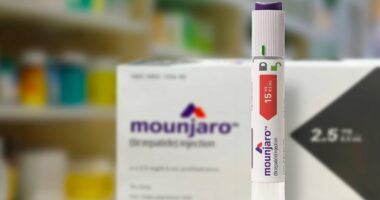Share this @internewscast.com
Dealing with dry, itchy skin is uncomfortable at best and it can even mess with your quality of life. After all, you can’t just tell your skin rash to take a break while you deal with other things.
But dermatologists say the best way to make your symptoms better is to figure out what could be behind your skin issues. Are you dealing with psoriasis, eczema, or something else entirely? Dermatologists break down how to know the difference between psoriasis vs. eczema—and how to get help.
What is psoriasis?
Psoriasis is an autoimmune condition that develops when your body makes skin cells too quickly, the American Academy of Dermatology (AAD) explains. This causes skin cells to pile up and form visible patches or spots on the skin. Fortunately, a psoriasis rash isn’t contagious, per the AAD.
What is eczema?
Eczema is a common skin condition that usually begins in childhood, and causes itchy, dry, and inflamed skin, the AAD says. Like psoriasis, eczema isn’t contagious.
How do the symptoms of psoriasis vs. eczema compare?
“Psoriasis and eczema are both chronic skin conditions, but they have distinct differences,” says board-certified dermatologist Ife J. Rodney, MD, founding director of Eternal Dermatology Aesthetics. “While they share some similar symptoms like redness and itching, their underlying causes and the appearance of affected skin differ.”
These are the main symptoms of psoriasis, according to the National Institute of Arthritis and Musculoskeletal and Skin Diseases (NIAMS):
- Patches of thick, red skin with silvery-white scales that itch or burn, and usually show up on the elbows, knees, scalp, trunk, palms, and soles of the feet
- Dry, cracked skin that itches or bleeds
- Thick, ridged, pitted nails
- Poor sleep quality
And these are the top signs of eczema, NIAMS says:
- Red, dry, extremely itchy patches of skin
- Rashes that may ooze or weep clear fluid, or bleed when scratched
- Thickening and hardening of the skin
How do I know if it’s eczema or psoriasis?
While both conditions cause skin rashes, they show up differently, says Cindy Wassef, MD, an assistant professor at the Rutgers Robert Wood Johnson Medical School. Psoriasis often causes a rash that’s a salmon pink, dark purple, or gray shade, depending on a person’s skin tone, she says, adding that the patches tend to have a silvery scale. “It can be associated with nail findings, like pitting,” she says.
“Eczema is more of light pink to brown color, with a fine white scale,” Dr. Wassef says.
Read Related Also: Children's hospitals prepare for surge in admissions amid shortage of RSV drug
Location matters, too, when you’re trying to determine whether you’re dealing with psoriasis vs. eczema. While you can technically have signs of either condition anywhere you have skin—whether that’s eczema on your scalp or psoriasis on your face—each tends to show up in different spots. “Psoriasis lesions are most common on the scalp, elbows, and knees,” says Gary Goldenberg, MD, a board-certified dermatologist practicing in New York City. “Eczema is most common on the backs of knees and fronts of elbows.”
What causes these conditions?
There is a difference in what causes psoriasis vs. eczema. “The exact cause of psoriasis is not fully understood, but it is believed to involve an immune system malfunction,” Dr. Rodney says. “Genetics also plays a significant role in psoriasis.” (Meaning, if you have a family history of psoriasis, the odds of you developing the condition are higher than average1.)
“Eczema is often linked to a combination of genetic and environmental factors,” Dr. Rodney says. “Triggers for eczema can include irritants like soaps and detergents, allergens like pollen or pet dander, infections, and stress.”
But “both conditions can be caused by environmental factors, stress, illness, nutrition, and other factors that we perhaps don’t understand,” Dr. Goldenberg says.
How is treatment different?
Treatment can vary for psoriasis vs. eczema, depending on how severe the symptoms are. “For mild eczema and psoriasis, the initial treatment with topical steroids is very similar,” Dr. Wassef says. “However, for more severe cases, injectable medications that work on the immune system target different areas for eczema and psoriasis. It would be important to know which rash you have.”
In general, psoriasis treatments can include topical corticosteroids, vitamin D ointments or creams, immunosuppressive medications, and light therapy, Dr. Rodney says. (Meanwhile, you’ll want to avoid exfoliants.) On the other hand, most types of eczema are usually “managed with moisturizers to keep the skin hydrated, along with topical corticosteroids or immunomodulators to reduce inflammation,” she says. “Avoiding triggers and allergens is crucial for managing eczema.”
How can you prevent psoriasis and eczema?
It can be tricky to fully prevent psoriasis and eczema due to their genetic components, Dr. Rodney says. But she says that flares and symptoms can usually be managed through lifestyle changes.
“For psoriasis, managing stress, avoiding injury to the skin, and adhering to prescribed treatments can help prevent exacerbations,” Dr. Rodney says. “For eczema, maintaining proper skin hydration with regular use of moisturizers, identifying and avoiding triggers, and practicing good skincare routines can prevent flare-ups and reduce the severity of symptoms.” Seasonal eczema care is also key.
If you’re dealing with a skin rash and you’re not sure what’s behind it, talk to your dermatologist. They’re well-versed in both skin conditions and can usually give you a diagnosis after examining your skin, Dr. Wassef says. From there, you can come up with a care plan together to help find the soothing relief you’re after.














